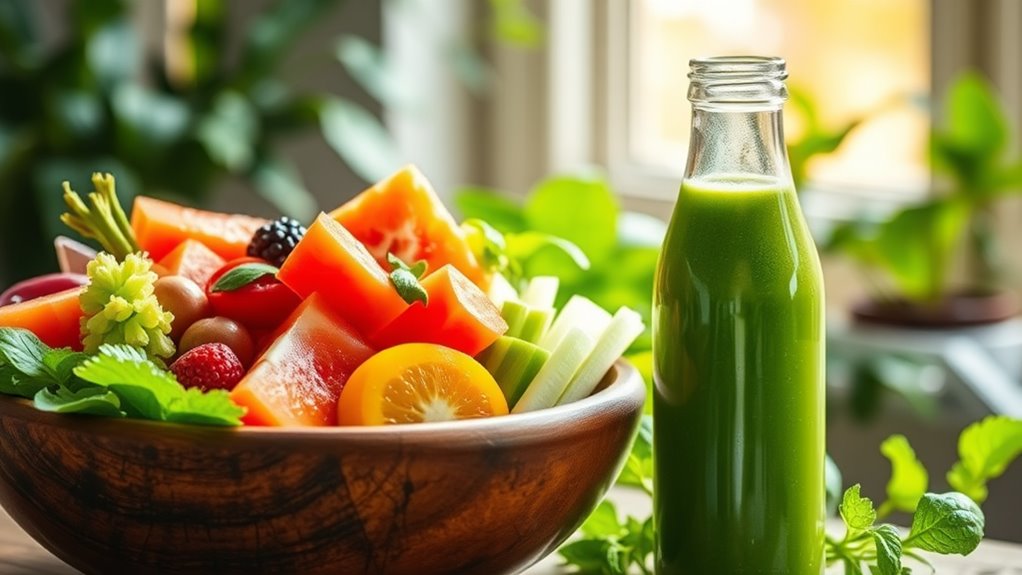Detox Diets- Helpful or Hype. What Science Says
Like the latest diet fad that promises miraculous transformations, detox diets have captivated many with their allure of cleansing and revitalization. However, while proponents tout benefits such as enhanced energy and better digestion, the scientific backing for these claims is often limited. It’s crucial to examine how your body already detoxifies naturally and consider what experts really have to say about these trendy regimens. What might be lurking beneath the surface?
Understanding Detox Diets: Definitions and Purpose
Detox diets have gained significant attention in recent years, sparking both intrigue and skepticism.
At their core, these diets aim to eliminate toxins from your body through specific food restrictions or cleanses.
Understanding detox facts is crucial—many claims lack scientific backing.
While some people report feeling better after a detox, you should consider the balance between potential benefits and the lack of substantial evidence.
The Science Behind Toxins and Detoxification
You’ve likely heard a lot about toxins in the body, but understanding their impact is crucial for making informed choices about detoxification.
Your body has natural processes to eliminate these substances, primarily through the liver, kidneys, and other systems.
Let’s explore the evidence behind detox diets and whether they truly support these functions or if they’re just a trend.
Understanding Toxins in Body
Your body constantly encounters a variety of toxins—substances that can be harmful in excessive amounts—which can come from environmental pollutants, processed foods, and even the body’s natural metabolic processes.
Understanding these toxins helps you make informed choices, such as:
- Airborne pollutants
- Heavy metals
- Food additives
- Alcohol
Awareness of these sources enables you to mitigate exposure and support your well-being effectively.
Natural Detoxification Processes
While many people seek out detox diets, it’s essential to recognize that the body has its own intricate systems for detoxification.
Organs like the liver, kidneys, and lungs play vital roles in processing and eliminating toxins. They use enzymes and other biochemical pathways to neutralize and expel harmful substances, ensuring your body remains balanced without needing extreme dietary restrictions or trendy detox plans.
Evidence-Based Detox Diets
Detox diets often claim to rid the body of harmful substances, but understanding the scientific evidence behind these claims is crucial.
Here’s what you should know:
-
The body detoxifies naturally.
-
Specific detox diets lack rigorous scientific support.
-
Healthy eating supports natural detoxification.
-
Consulting healthcare professionals is essential for personalized advice.
Evidence suggests that balanced nutrition is more effective than extreme detox measures.
Common Types of Detox Diets
When exploring detox diets, you’ll likely encounter juice cleanses and elimination diets.
Juice cleanses often involve consuming only fruit and vegetable juices for a set period, claiming to detoxify the body.
On the other hand, elimination diets focus on removing certain food groups to identify potential allergens or intolerances, promoting a clearer understanding of your dietary needs.
Juice Cleanses Explained
Have you ever wondered what juice cleanses really involve and whether they’re a smart choice for your health?
These short-term diets typically consist of consuming only juices made from fruits and vegetables.
Key points include:
- Potential for quick weight loss
- Increased nutrient intake
- Low calorie consumption
- Short-term detoxification claims
While they may boost hydration and vitamins, they often lack essential nutrients and could lead to fatigue.
Elimination Diets Overview
Elimination diets offer a structured approach to identifying food sensitivities and improving overall health by removing specific foods from your diet for a set period.
Common types include the gluten-free diet, dairy-free diet, and low-FODMAP diet. You’ll typically reintroduce foods gradually to observe reactions.
While these diets can help pinpoint triggers, it’s essential to consult a healthcare professional for guidance.
Potential Health Benefits of Detox Diets
While some skeptics debate the effectiveness of detox diets, proponents often highlight several potential health benefits that could make them appealing.
You might experience:
- Increased energy levels
- Improved digestion
- Enhanced mental clarity
- Support for weight loss
These benefits can motivate individuals to explore detox diets as a way to refresh their health. Additionally, incorporating immune-boosting foods into your detox can further enhance overall health and vitality.
However, it’s essential to consider the science behind these claims.
Risks and Drawbacks of Detox Diets
Although detox diets may promise quick health benefits, they also come with several risks and drawbacks that you should consider before diving in.
These diets can lead to nutrient deficiencies, dehydration, and fatigue.
Additionally, the restrictive nature might trigger disordered eating patterns.
It’s essential to weigh these potential negative effects against any perceived benefits to make an informed decision about your health.
Expert Opinions and Recommendations
Many experts express caution when it comes to detox diets, emphasizing that the body is naturally equipped to eliminate toxins without the need for extreme measures.
-
Focus on a balanced diet rich in fruits and vegetables.
-
Stay hydrated to support kidney and liver function.
-
Limit processed foods and added sugars.
-
Consult a healthcare professional before starting any restrictive regimen.
Ultimately, moderation and lifestyle changes are key. Incorporating healthy eating tips can further enhance your overall wellness without the need for detox diets.



